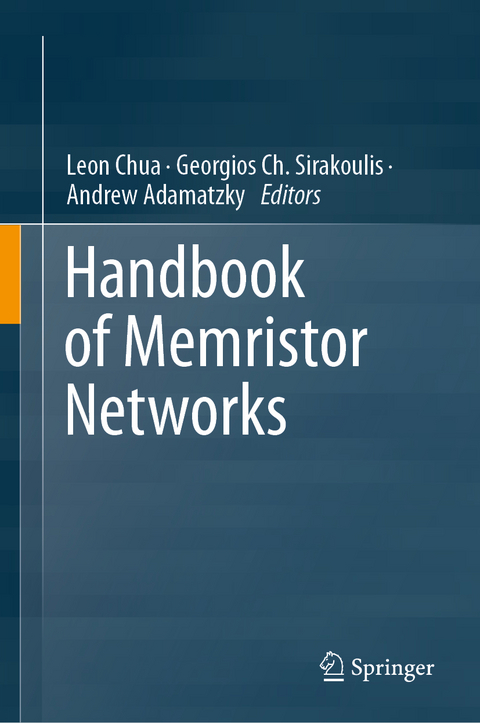
Handbook of Memristor Networks
Springer International Publishing
978-3-319-76374-3 (ISBN)
This Handbook presents all aspects of memristor networks in an easy to read and tutorial style. Including many colour illustrations, it covers the foundations of memristor theory and applications, the technology of memristive devices, revised models of the Hodgkin-Huxley Equations and ion channels, neuromorphic architectures, and analyses of the dynamic behaviour of memristive networks. It also shows how to realise computing devices, non-von Neumann architectures and provides future building blocks for deep learning hardware.
With contributions from leaders in computer science, mathematics, electronics, physics, material science and engineering, the book offers an indispensable source of information and an inspiring reference text for future generations of computer scientists, mathematicians, physicists, material scientists and engineers working in this dynamic field.
Leon Chua is a Professor in Electrical and Computer Science at Berkeley. His research interests include Cellular Neural/Nonlinear Networks, Nonlinear Circuits and Systems, Nonlinear Dynamics, Bifurcation and Chaos. Dr. Georgios Ch. Sirakoulis is an Associate Professor with tenure in the Department of Electrical and Computer Engineering, Democritus University of Thrace. His research interests include Nanoelectronics and nanotechnology, future and emergent electronic devices, circuits, models and architectures (memristors, quantum cellular automata etc.), Novel and Emergent micro-nano systems and circuits, beyond CMOS computing devices and circuits, Memristors, Green and Unconventional computing, High performance Computing, Novel paradigms of computing, Cyber-Physical and Embedded Systems, Bioinspired computation/ biocomputation and bioengineering, Cellular Automata Theory and Applications, FPGAs, Modelling and Simulation, Complex systems. Andrew Adamatzky is a Professor in Unconventional Computing in the Department of Computer Science, Director of the Unconventional Computing Centre, and a member of Bristol Robotics Lab. His research is in reaction-diffusion computing, cellular automata, physarum computing, massive parallel computation, applied mathematics, collective intelligence and robotics.
The Fourth Element.- Aftermath of Finding the Memristor.- Three Fingerprints of Memristor.- Resistance Switching Memories Are Memristors.- The Detectors Used in the First Radios Were Memristors.- Why Are Memristor and Memistor Different Devices?.- The Art and Science of Constructing a Memristor Model: Updated.- Memristor, Hodgkin-Huxley, and Edge of Chaos.- Brains Are Made of Memristors.- Synapse as a Memristor.- Memristors and Memristive Devices for Neuromorphic Computing.- Bio-inspired Neural Networks.- Self-organization and Emergence of Dynamical Structures in Neuromorphic Atomic Switch Networks.- Spike-Timing-Dependent-Plasticity with Memristors.- Designing Neuromorphic Computing Systems with Memristor Devices.- Brain-inspired Memristive Neural Networks for Unsupervised Learning.- Neuromorphic Devices and Networks Based on Memristors with Ionic Dynamics.- Memristor Bridge-Based Artificial Neural Weighting Circuit.- Cellular Nonlinear Networks with Memristor Synapses.- Evolving Memristive Neural Networks.- Behavior of Multiple Memristor Circuits.- A Memristor-Based Chaotic System with Boundary Conditions.- Associative networks and perceptron based on memristors: fundamentals and algorithmic implementation.- Spiking Neural Computing in Memristive Neuromorphic Platforms..- Spiking in Memristor Networks.- Organic Memristive Devices and Neuromorphic Circuits.- Associative Enhancement and its Application in Memristor based Neuromorphic Devices.- Three-dimensional Crossbar of Self-rectifying Si/SiO2/Si Memristors.- The Self-Directed Channel Memristor: Operational Dependence on the Metal-Chalcogenide Layer.- Memristive in Situ Computing.- A Taxonomy and Evaluation Framework for Memristive Logic.- Memristive Stateful Logic.- Memory Effects in Multi-terminal Solid State Devices and Their Applications.- Memristor-Based Addition and Multiplication.- Memristor Emulators.- Switching Synchronization and Metastable States in 1D Memristive Networks.- Modeling Memristor-BasedCircuit Networks on Crossbar Architectures.- Computing Shortest Paths in 2D and 3D Memristive Networks.- Computing Image and Motion with 3-D Memristive Grids.- Solid-State Memcapacitors and Their Applications.- Reaction-Diffusion Media with Excitable Oregonators Coupled by Memristors.- Mimicking Physarum Space Exploration with Networks of Memristive Oscillators.- Autowaves in a Lattice of Memristor-Based Cells.- Index.
| Erscheint lt. Verlag | 26.11.2019 |
|---|---|
| Zusatzinfo | XIV, 1368 p. 790 illus., 615 illus. in color. In 2 volumes, not available separately. |
| Verlagsort | Cham |
| Sprache | englisch |
| Maße | 155 x 235 mm |
| Gewicht | 2416 g |
| Themenwelt | Mathematik / Informatik ► Informatik ► Theorie / Studium |
| Informatik ► Weitere Themen ► Hardware | |
| Technik ► Elektrotechnik / Energietechnik | |
| Schlagworte | Computation • Electronic Component • Memristor Networks • State-dependent Ohm's law • Two-terminal device |
| ISBN-10 | 3-319-76374-1 / 3319763741 |
| ISBN-13 | 978-3-319-76374-3 / 9783319763743 |
| Zustand | Neuware |
| Haben Sie eine Frage zum Produkt? |